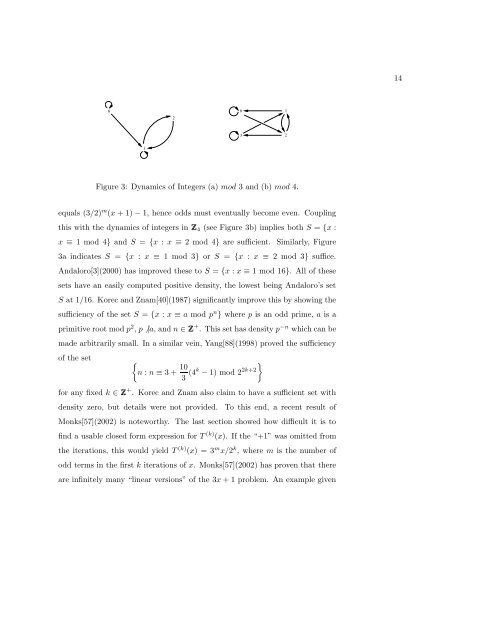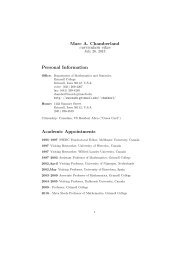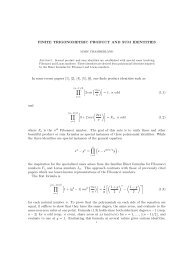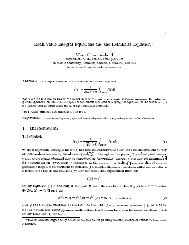An Update on the 3x+1 Problem Marc Chamberland Contents
An Update on the 3x+1 Problem Marc Chamberland Contents
An Update on the 3x+1 Problem Marc Chamberland Contents
You also want an ePaper? Increase the reach of your titles
YUMPU automatically turns print PDFs into web optimized ePapers that Google loves.
14<br />
0 0<br />
2<br />
1<br />
3<br />
2<br />
1<br />
Figure 3: Dynamics of Integers (a) mod 3 and (b) mod 4.<br />
equals (3/2) m (x + 1) − 1, hence odds must eventually become even. Coupling<br />
this with <strong>the</strong> dynamics of integers in Z 4 (see Figure 3b) implies both S = {x :<br />
x ≡ 1 mod 4} and S = {x : x ≡ 2 mod 4} are sufficient. Similarly, Figure<br />
3a indicates S = {x : x ≡ 1 mod 3} or S = {x : x ≡ 2 mod 3} suffice.<br />
<str<strong>on</strong>g>An</str<strong>on</strong>g>daloro[3](2000) has improved <strong>the</strong>se to S = {x : x ≡ 1 mod 16}. All of <strong>the</strong>se<br />
sets have an easily computed positive density, <strong>the</strong> lowest being <str<strong>on</strong>g>An</str<strong>on</strong>g>daloro’s set<br />
S at 1/16. Korec and Znam[40](1987) significantly improve this by showing <strong>the</strong><br />
sufficiency of <strong>the</strong> set S = {x : x ≡ a mod p n } where p is an odd prime, a is a<br />
primitive root mod p 2 , p ̸ |a, and n ∈ Z + . This set has density p −n which can be<br />
made arbitrarily small. In a similar vein, Yang[88](1998) proved <strong>the</strong> sufficiency<br />
of <strong>the</strong> set {n : n ≡ 3 + 10 }<br />
3 (4k − 1) mod 2 2k+2<br />
for any fixed k ∈ Z + . Korec and Znam also claim to have a sufficient set with<br />
density zero, but details were not provided.<br />
To this end, a recent result of<br />
M<strong>on</strong>ks[57](2002) is noteworthy. The last secti<strong>on</strong> showed how difficult it is to<br />
find a usable closed form expressi<strong>on</strong> for T (k) (x). If <strong>the</strong> “+1” was omitted from<br />
<strong>the</strong> iterati<strong>on</strong>s, this would yield T (k) (x) = 3 m x/2 k , where m is <strong>the</strong> number of<br />
odd terms in <strong>the</strong> first k iterati<strong>on</strong>s of x. M<strong>on</strong>ks[57](2002) has proven that <strong>the</strong>re<br />
are infinitely many “linear versi<strong>on</strong>s” of <strong>the</strong> 3x + 1 problem. <str<strong>on</strong>g>An</str<strong>on</strong>g> example given





